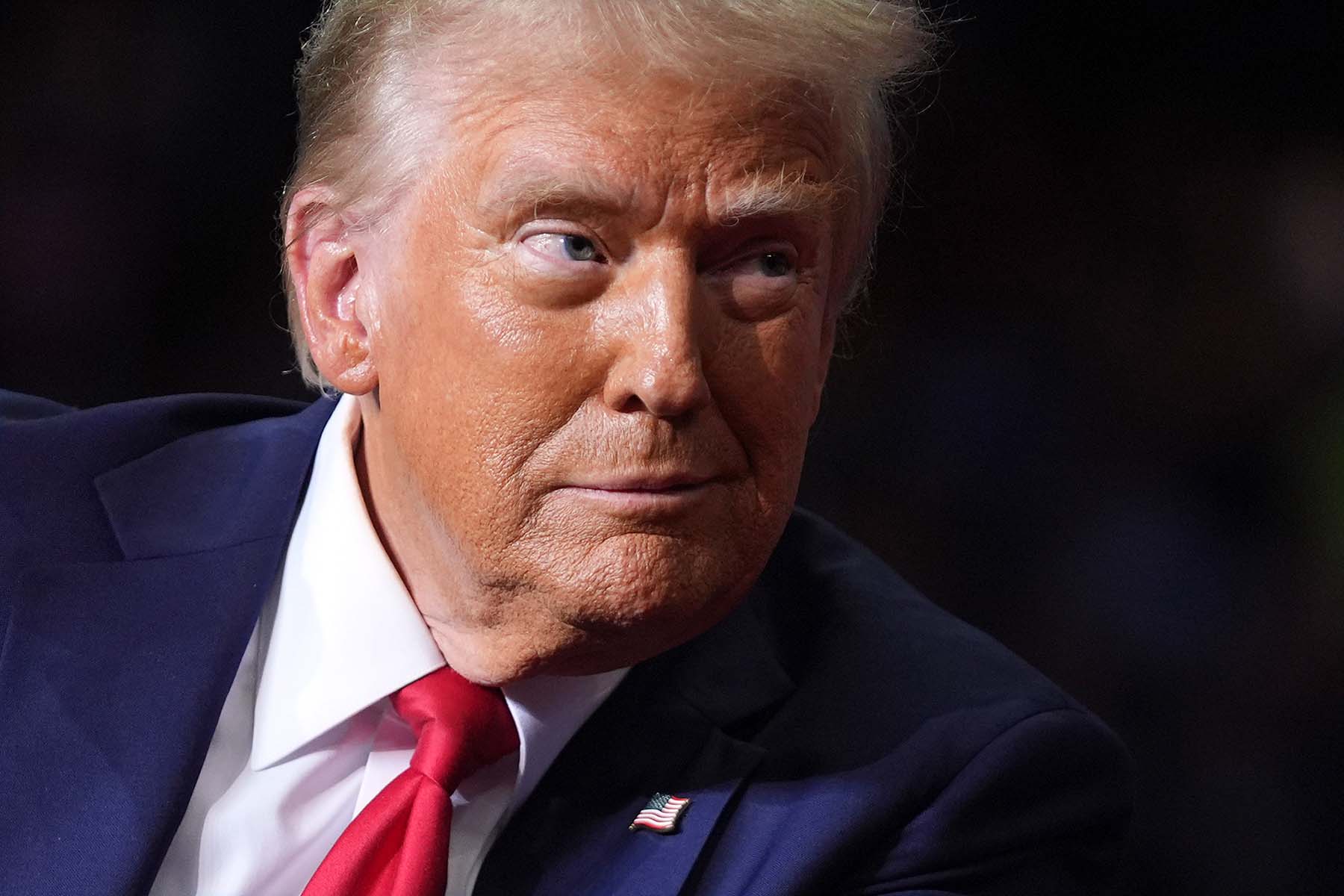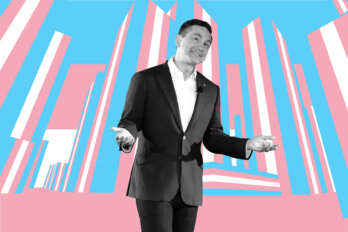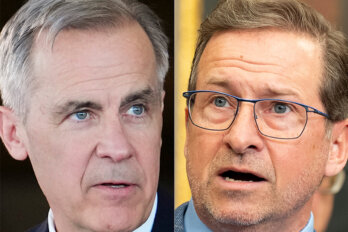Late in April 2023, prime-time broadcaster Tucker Carlson was set to air, on Fox News, a documentary he had prepared advocating that the United States invade Canada to free the country from the tyranny of the Justin Trudeau government. The documentary was cancelled after the popular MAGA—“Make America great again”—mouthpiece was fired for sending a racist text message during litigation over false voting system allegations.
Carlson had long been an enthusiastic supporter of the so-called Freedom Convoy that had occupied Ottawa in February 2022. By January 2023, he was asking why the US government hadn’t yet acted in response to Canada’s vaccine mandates—most of which were relaxed by the time he spoke. “Why are we not sending an armed force north to liberate Canada from Trudeau?” Carlson insisted that he meant this, though later he chuckled and said, “I’m just talking myself into a frenzy here.”
In recent years, Carlson had frequently referred to Canada in derogatory terms. “Canada is a sweet country,” he said at one point. “It is like your retarded cousin you see at Thanksgiving and sort of pat him on the head. You know, he’s nice, but you don’t take him seriously. That is Canada.” In the documentary, which the public has yet to see, he asks whether the US shouldn’t “liberate” people living under authoritarian rule. “What if tyranny arrived right next door?” he asked in a promo for the Canada episode. “What would that look like? And what would our government do in response?”
Carlson took issue with the Emergency Measures Act, which the Canadian government used to shut down the truckers who parked big rigs out front of the Parliament Buildings, blaring horns. According to a national survey released in February 2023 by the Maru Group, 66 percent of Canadians applauded the invocation of the act. Two-thirds of the populace had grown tired of the malcontents—heavily funded by American billionaires—taking over Ottawa. Some Canadians may have been swayed by a ruling in January 2024 that the invocation of the act was illegal. Others see that as judicial nitpicking.
The point here is that, even if Carlson’s documentary got shelved, the idea that the American military could invade Canada entered the mainstream news cycle. Reflecting on this, I found myself remembering a wealthy American woman I met in 2016 who wondered why I was taking such keen interest in the presidential election. Subsequent events, culminating in the Trump-inspired assault on the Washington Capitol, more than justified my concern.
On January 6, 2021, a joint session of Congress had begun counting electoral college votes to formalize Joe Biden’s victory. Trump demanded that Vice President Mike Pence and Congress reject the election results and keep him in power. That morning, at a “Save America” rally held not far from the Capitol in Washington, the outgoing president urged thousands of right-wing activists to “fight like hell” in support of his false, unsupported contention that the election had been “stolen” from him. In response, a well-organized crowd of hundreds, many with military training, breached police perimeters and streamed into the heart of the United States Congress. They occupied, vandalized, and looted parts of the building. They erected a gallows on the grounds, and some, blaming the vice president for not acting illegally to reinstate Trump, wandered the building chanting “Hang Mike Pence.” Others looted the office of Democratic House leader Nancy Pelosi.
Reports indicate that, safe in the White House, watching on television, Trump was thrilled to see what he had instigated. Initially, he resisted dispatching the National Guard. He released a video calling the rioters “very special” and, while reiterating his false claim that the election had been stolen, urged them to “go home in peace.” Meanwhile, five people lost their lives. The injured included 138 police officers—among them four who later took their own lives.
Initially, Republican House leader Mitch McConnell, a long-time Trump ally, called the storming of the Capitol a “failed insurrection” inspired by the president’s lies and said the Senate “will not bow to lawlessness or intimidation.” Soon enough, he himself would be bowing and scraping.
The House of Representatives voted to impeach Trump for “incitement of insurrection,” making him the only US president to have been impeached twice. But because a guilty verdict required a two-thirds majority vote in Congress, and Republicans were reluctant to vote against one of their own, the ensuing trial ended in acquittal. That was just the beginning. Ever since then, Trumpists have been working furiously to alter the legal system to subvert democracy.
Trump has declared that he intends to act like a dictator for a day. Some say he was joking, but I wouldn’t bet on it. Certainly, he believes himself to be above the law. Most observers believe that, early in another term, he would target the justice department and seek to turn it into an instrument of vengeance against his political adversaries. He would also go after the intelligence community, which he considers the “deep state,” and already has people drawing up lists of “disloyal officials.” He would move quickly against immigrants, introducing a new Insurrection Act that would allow mass roundups and deportations of the undocumented.
Trump would probably withdraw the US from NATO and leave Ukraine to its own devices and the goodwill of Vladimir Putin. Would that be it on the international stage? At least one notable American historian thinks so. I draw your attention to Christopher R. Browning, who has written extensively about Nazi Germany. In an article in The Atlantic published in July 2023, Browning writes that he has long resisted calling Trump a fascist, though he worries now “that if he wins another trip to the White House, he could earn the label.” Browning explains that where Hitler and Mussolini “were ardent militarists and imperialists” bent on territorial expansion, Trump has shown no such inclination.
In his first term, Browning writes, Trump adopted a fascist style, complete with inflammatory, rhetoric-charged rallies. He encouraged a sense of grievance and victimization, endorsed violence, targeted vulnerable minorities, and revelled in a cult of personality. But his presidency “lacked any warlike, expansionist interest,” and that made it different from twentieth-century fascism. A second term for Trump would be more efficient, Browning writes, and promises “something much closer to dictatorship at home.” He anticipates an “isolationist fascism.”
Speaking as a Canadian, I am less sanguine about the “isolationist” part. In January 2024, Carlson addressed a Calgary audience of 4,000 at the invitation of Alberta premier Danielle Smith—and inspired numerous standing ovations. That reception suggests that a significant minority of Canadians would be ready to collaborate with any American occupation.
Carlson ridiculed Prime Minister Trudeau and called Deputy Prime Minister Chrystia Freeland “a mentally deficient fascist.” Without providing evidence, according to newspaper reports, he dismissed the 2021 storming of the US Capitol as a “setup” orchestrated by “the left.” And he urged people to “dislike and resist” the current Canadian government “to the maximum extent of your ability.” He also offered up homophobic and transphobic jokes.
Liberal cabinet members fired back, suggesting that Carlson’s broadsides showed that Trumpism had arrived in Canada. “Don’t ask the question if it’s coming to Canada,” said Transport Minister Pablo Rodriguez. “It’s already here.”
Let’s return to the siege of Ottawa in February 2022, when big-rig trucks occupied the downtown core of the city. Here we had a different kind of invasion—not a military incursion from without but an ideological one from within, undertaken mostly by Canadians relying heavily on Trumpist funding. Would you believe $4.6 million came from the US—40 percent of the total. A San Francisco billionaire, Thomas M. Siebel, made the largest single contribution. In Canadian dollars, he donated almost $115,000. A more modest $2,500 came from Arizona-based Republican activist Mike Schroeder. According to the Globe and Mail, Schroeder is the former owner of a satellite television company—a man who has advocated looser gun laws and believed the conspiracy theory that hospitals inflated pandemic figures.
“My God, the things they’re doing up there,” he said, referring to Canada’s vaccine regulations, which kept Canadian death rates far below those in the US. “Enough is enough. These guys [the Ottawa occupiers] have stood up to it, and good for them.” Schroeder also described Trudeau’s invocation of the Emergency Measures Act as totalitarian in nature: “That’s North Korea or Communist China. That’s how they run it over there. I wouldn’t even think about setting foot in Canada.”
To be fair, another American, Chicago Tribune columnist Rex Huppke, wrote an open letter in which he apologized for giving Canadians “a bad case of the American stupids.” Huppke summarized a few incidents, including the defacing of national monuments and the sighting of a Canadian flag featuring a swastika. Defacing national monuments while griping “is kind of our thing,” he wrote, observing—rightly, I think—that the Ottawa siege was modelled on the attack on the Capitol—“a deadly temper tantrum by pretend patriots in thrall to a noted huckster.”
Nor was Huppke the only American to express this opinion. Steve Schmidt, a former Republican strategist for George W. Bush, spoke out on MSNBC. When the “Freedom Convoy” was happening, he described Ottawa as besieged by a fascist occupation organized and funded by the American alt-right. The Confederate and Nazi flags and other hate symbols were no accident, he said, urging those who believe in pluralism and democracy to wake up.
The storming of the Capitol, Schmidt said, was the result of “a conspiracy amongst many parties, headed by the president of the United States, to try to obstruct, destroy, obliterate the peaceful transition of power in the country.” This “autocratic movement is a cult of personality,” he added, “fueled by grievance and conspiracy theories.” The whole toxic stew has “metastasized north of the border, and you have an insurrection underway in the capital of a very important country, our neighbor to the north, Canada.”
What happened in Ottawa was an echo insurrection. Again, it calls into question the idea that Trumpism represents “isolationist fascism.” The distinction is worth making because, as I write, we are heading toward another US election—one in which the Republican base has succeeded in putting forward Trump as their candidate. This despite four indictments—two on state charges and two on federal ones—encompassing a total of ninety-one felony charges. Were Trump to regain office, he would not hesitate to subvert the democratic process. He has made that clear. And so, like the war correspondents of the 1930s, we find ourselves crying: Wake up! Look around! See what is happening next door!
Excerpted from Shadows of Tyranny: Defending Democracy in an Age of Dictatorship by Ken McGoogan, 2024, published by Douglas and McIntyre (2013) Ltd. Reprinted with permission from the publisher.




